L.5. Safety of officers in dismantling illicit synthetic opioid laboratories
OP 2 (c)
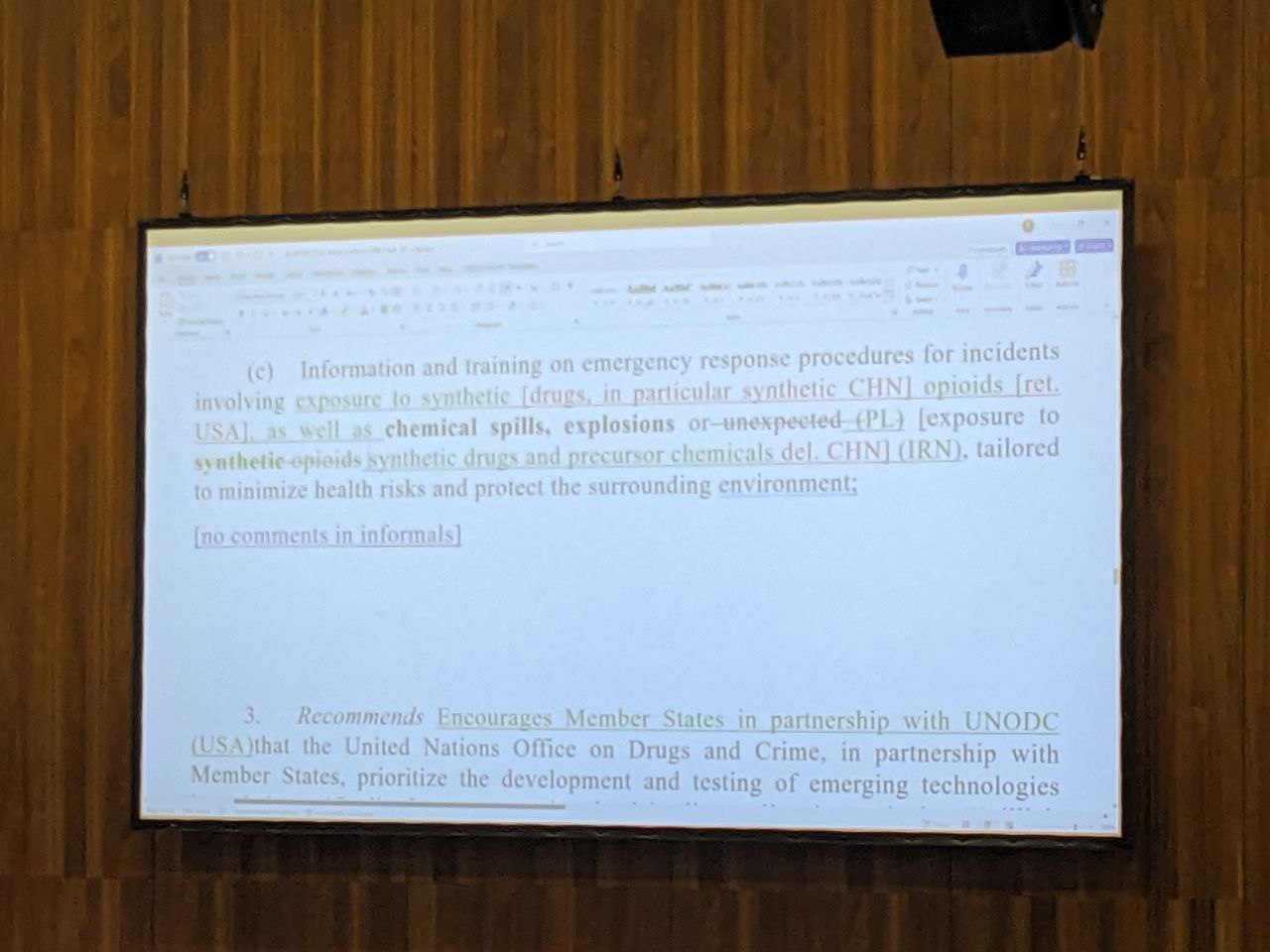 (…)
(…)
China: We would like to delete the wording from ‘exposure’ to ‘chemicals’.
United States: WE would like to remain faithful to the intention of sponsors, which is in line with our policy. This resolution is for all member states but some times we need to get into specifics when we talk about specific interventions so we want to repeat the language as it was.
Chair: Back to informals
United States: we would like to add a sub-item (d) – ‘Accurate recognition of the signs and symptoms of opioid overdose and the administration of naloxone or other opioid overdose reversal medications’.
China: This is newly suggested so we would need to consider it. I will say that we are at CND and need to consider the 3 UN conventions and also our national contexts. We try our best to cover most of the countries concerned — not just some.
Poland: On the US colleagues proposal — we’d like to use the language already presented in CND Resolution 55/7: ‘administration of opioid receptor antagonists, such as naloxone hydrochloride and other opioid overdose reversal medications, in line with CND resolution 55/7, and relevant UNODC initiatives on overdose prevention’.
Chair: Further consider this in informals as requested by China.
OP 3
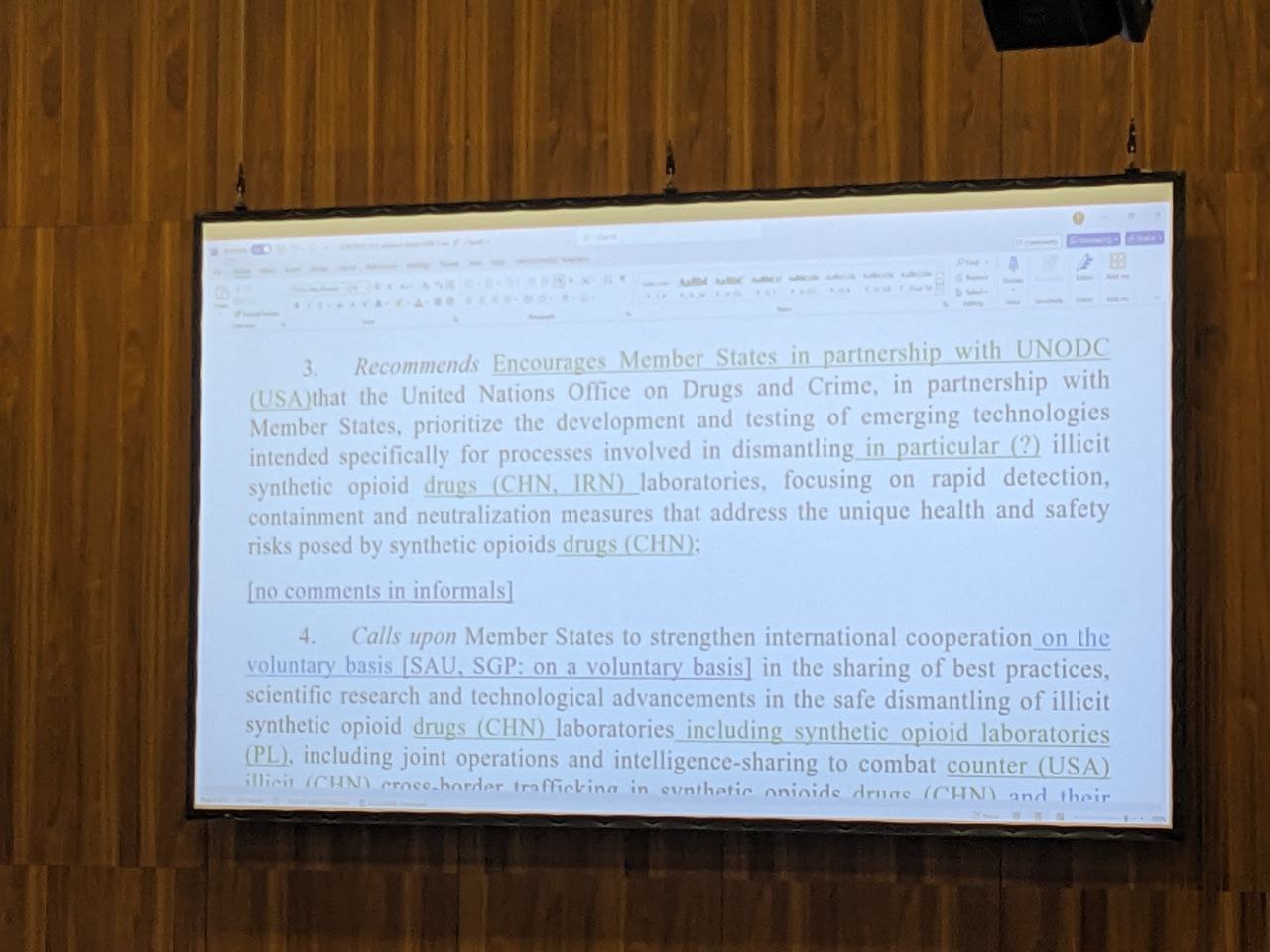
China: Clarify that our suggestion is to say ‘drugs’ not ‘opioids’ across the text.
Chair: Views?
United States: First time considering this. At the end of the paragraph we’re saying ‘measures that address the unique health and safety risks posed by…’, and then we say ‘synthetic drugs’. It’s difficult to say ‘unique’ and then open it to ‘synthetic drugs’. We would rather go for the solution China has referred to before, at the end of the sentence ‘drugs, in particular synthetic opioids’.
China: To reach consensus, we’ll be flexible here.
Chair: Agreed?
Sudan: We have ‘in particular’ in this paragraph because we say ‘synthetic drugs’ and ‘synthetic opioids’.
Chair: I’d like to ask the room to agree to have ‘encourages’ instead of ‘recommend’.
China: Beginning of para may be misunderstood. We say ‘in partnership with’ twice.
Chair: Agreed?
Sudan: We have ‘in particular’ in this paragraph because we say ‘synthetic drugs’ and ‘synthetic opioids’.
Chair: I’d like to ask the room to agree to have ‘encourages’ instead of ‘recommend’.
China: Beginning of para may be misunderstood. We say ‘in partnership with’ twice.
Chair: I suggest ‘Encourages Member States, in partnership with UNODC, prioritise…’
United States: ‘…to prioritise…’
Chair: Agreed? Agreed in CoW.
OP 4
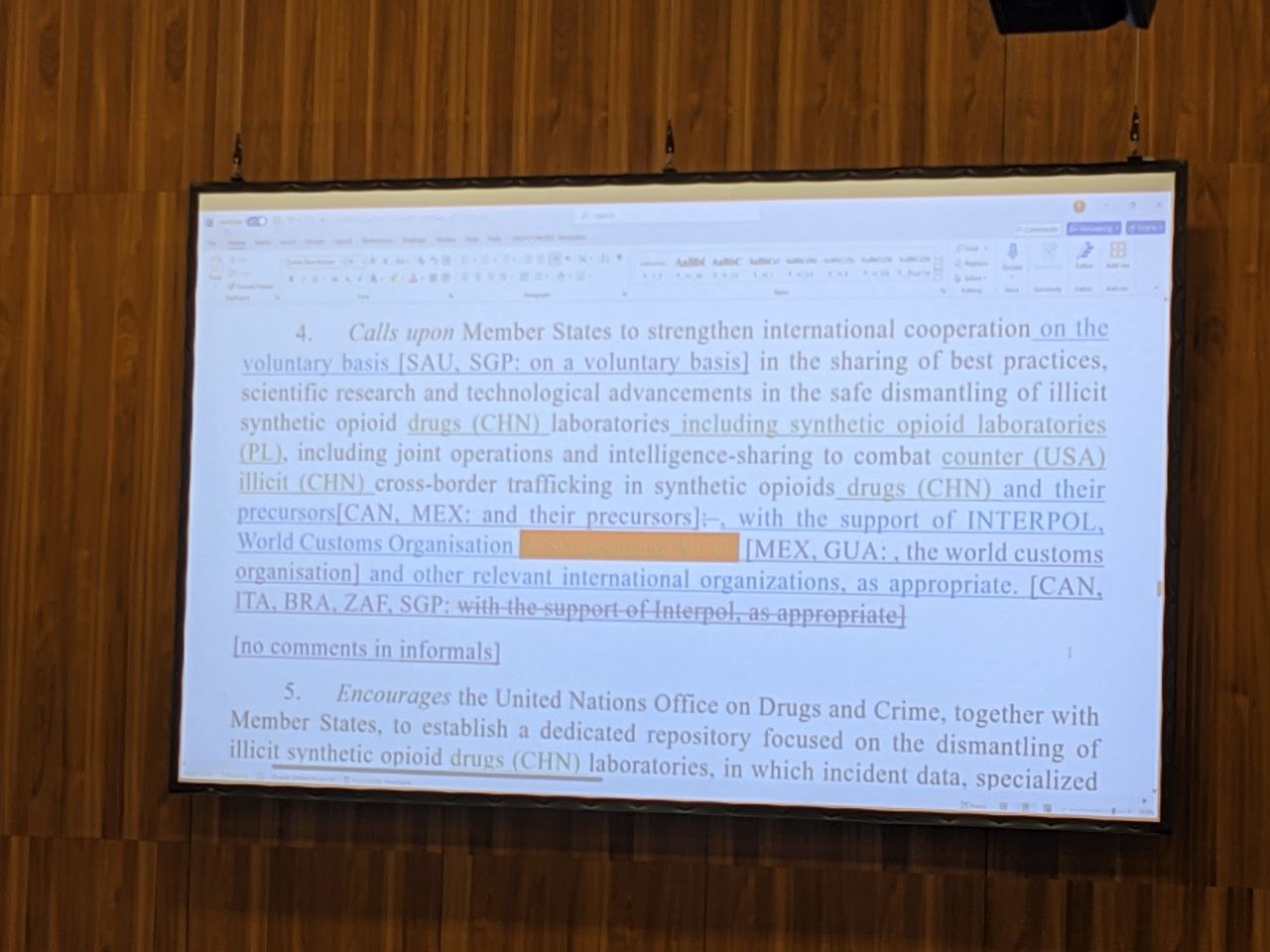
China: As before, delete ‘synthetic opioids’ and say ‘synthetic drugs’. INCB should appear before INTERPOL and the World Customs Organisation. ‘With the support of UNODC, INCB, INTERPOL…’. We suggest deleting ‘and their precursors’.
United States: We will for now reserve on INTERPOL and World Customs Organisation.
Turkey: We want to keep INTERPOL.
United States: It’s pending guidance so we cannot mark as ‘agreed in CoW’.
Chair: We want to say ‘agreed in CoW pending US reservation’.
Mexico: My comment was on including World Customs Organisations because this is one of the entities accompanying the UN to bring the Single Convention into adoption. It’s always been here and relevant — that’s why we want to keep it.
Canada: For us it’s critical we keep ‘and their precursors’ — we will not agree to the text unless that’s included.
Chair: Could China reconsider its position on ‘precursors’ — maybe adding ‘if appropriate’.
China: We can be flexible but we would like to add something. After ‘and their precursors’: ‘…, in accordance with each country’s domestic laws and legislations,…’
Mexico: The issue of precursors is very important for us too. We appreciate the Chinese flexibility on this issue but I don’t know this is the place to put caveats and we follow the guidelines of the main sponsors. We just had a conversation with Iran on the issue of production of precursors and they mentioned how designer precursors are being produced not just for the manufacture of synthetic drugs — we want to reflect this issue. Iran would agree ‘where appropriate’ if we’re talking about designer precursors.
China: I want to echo Mexico, our concern on precursor chemicals are different from illicit drugs. Some have licit use and may be diverted to manufacture drugs. Big use in industries. So that’s why we need to mention here ‘in accordance with domestic laws and legislation’. One substance may be scheduled in one country, but not in another country. China uses different cooperation channels to note anything of concern — but we have different laws that we need to acknowledge.
Chair: Let’s keep this paragraph for further consultations.
Poland: Regarding China’s proposal, if they would agree, we’d like to use different wording on that text — instead of ‘in accordance with…’ say ‘recognising differences in national legal frameworks…’
Chair: Acceptable for China?
China: Apologies, those two phrases have different meaning. I still want the original wording. We can make it simpler, we can accept that.
Chair: Suggestions to simplify?
United States: What’s being qualified here re: ‘in accordance with…’. Is it ‘joint operations and intelligence sharing’? Or ‘precursors’…? If the concern is differences in legality, that’s addressed already in the text by both the terms ‘illicit’ and ‘trafficking’ — those terms state that the precursors are not licit or legal in the use of wherever they’re encountered. ‘In accordance…’ could be more easily reflected as ‘in accordance with domestic law’ — i suggest including after ‘intelligence sharing’. If we do it after precursors then we have a triple qualifier.
Chair: Please continue in informals.
OP5
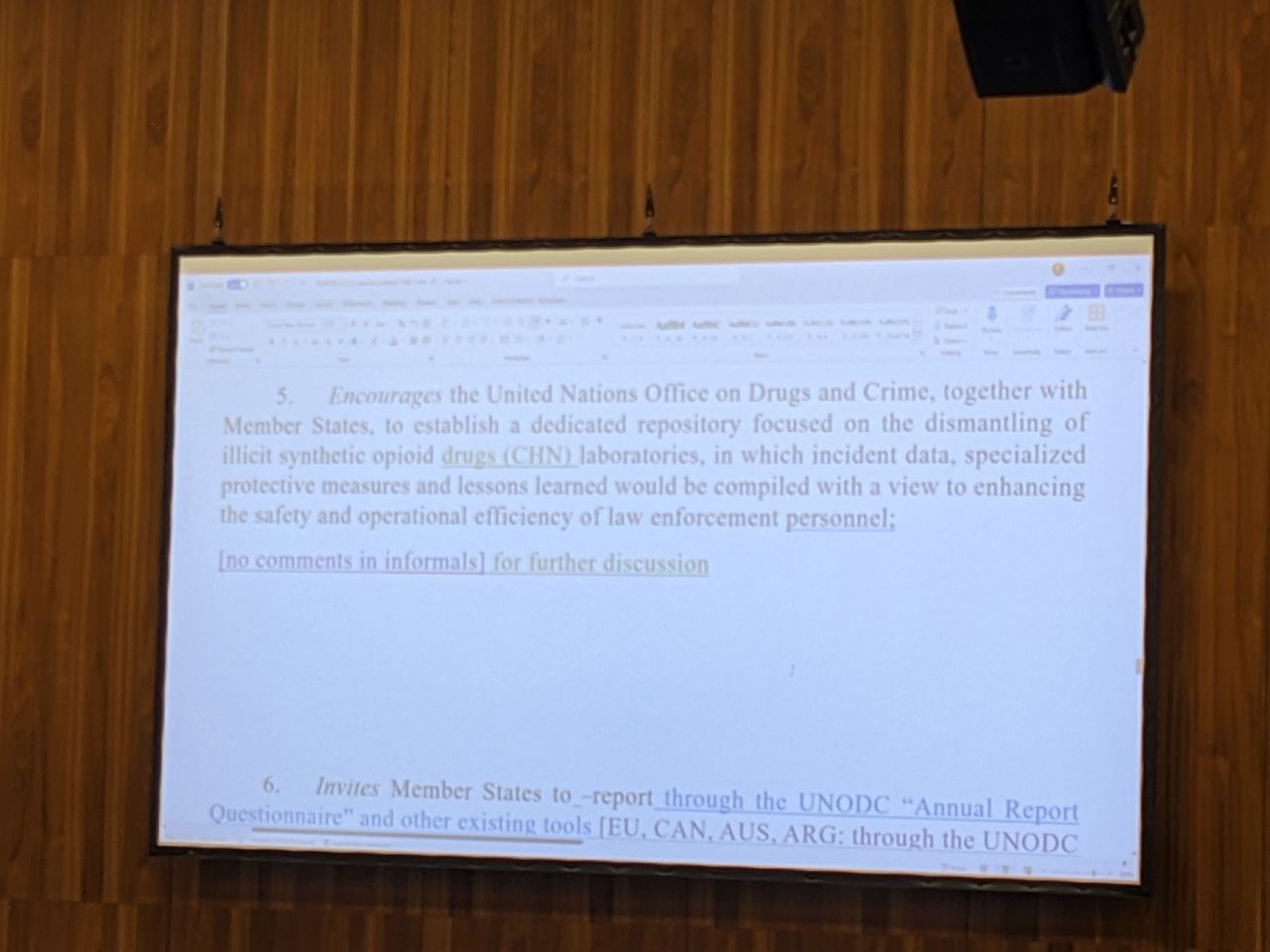
Chair: Any comments? Agree as it stands?
United States: Following ‘laboratories’ we’d like ‘…, with a particular emphasis on synthetic opioids…’
Singapore: We’d like to add ‘…on a voluntary basis’ next to ‘together with Member States’.
China: We can be flexible with those suggestions.
United States: If I can ask through you to Singapore what we’re trying to qualify on a voluntary basis? Encourages the UNODC…on a voluntary basis? Whose voluntary basis? The Member States? If so, then the comma between ‘Member States’ and ‘on’ needs deleting.
Singapore: That’s fine.
Chair: Can we agree as a whole?
United States: We’re trying to understand the intent of this. We wouldn’t want to just establish a repository but encourage Member States to use or contribute to it. Give us some time and we can reflect our thoughts here.
Chair: Reactions?
China: Simpler suggestion: use ‘in particular, synthetic opioids’ instead of ‘with a particular emphasis’?— Would that be acceptable?
United States: Add at the end of the paragraph ‘invites Member States to contribute data on a voluntary basis to the repository’. We can work on the exact language but that’s our thinking. We don’t want UNODC establish something that sits there unused — we want Member States to contribute and use that data.
Chair: Do we need to keep ‘on a voluntary basis’ at the beginning, then?
Finland: We like the proposal by the US. Perhaps Singapore can be flexible given that ‘voluntary basis’ is mentioned here when it comes to contributing data. We propose deleting it from the second line — so that we don’t have ‘voluntary basis’ when it comes to establishment but rather on participation / contribution.
Singapore: We can be flexible and delete as suggested.
Chair: Can we consider this ‘agreed in CoW’? Can we remove ‘with a particular emphasis’ and say ‘in particular’ as suggested by China?
United States: Yes if we change the noun accordingly so that it’s grammatically correct.
Chair: Can we consider Agreed in CoW? It’s decided.
OP 6
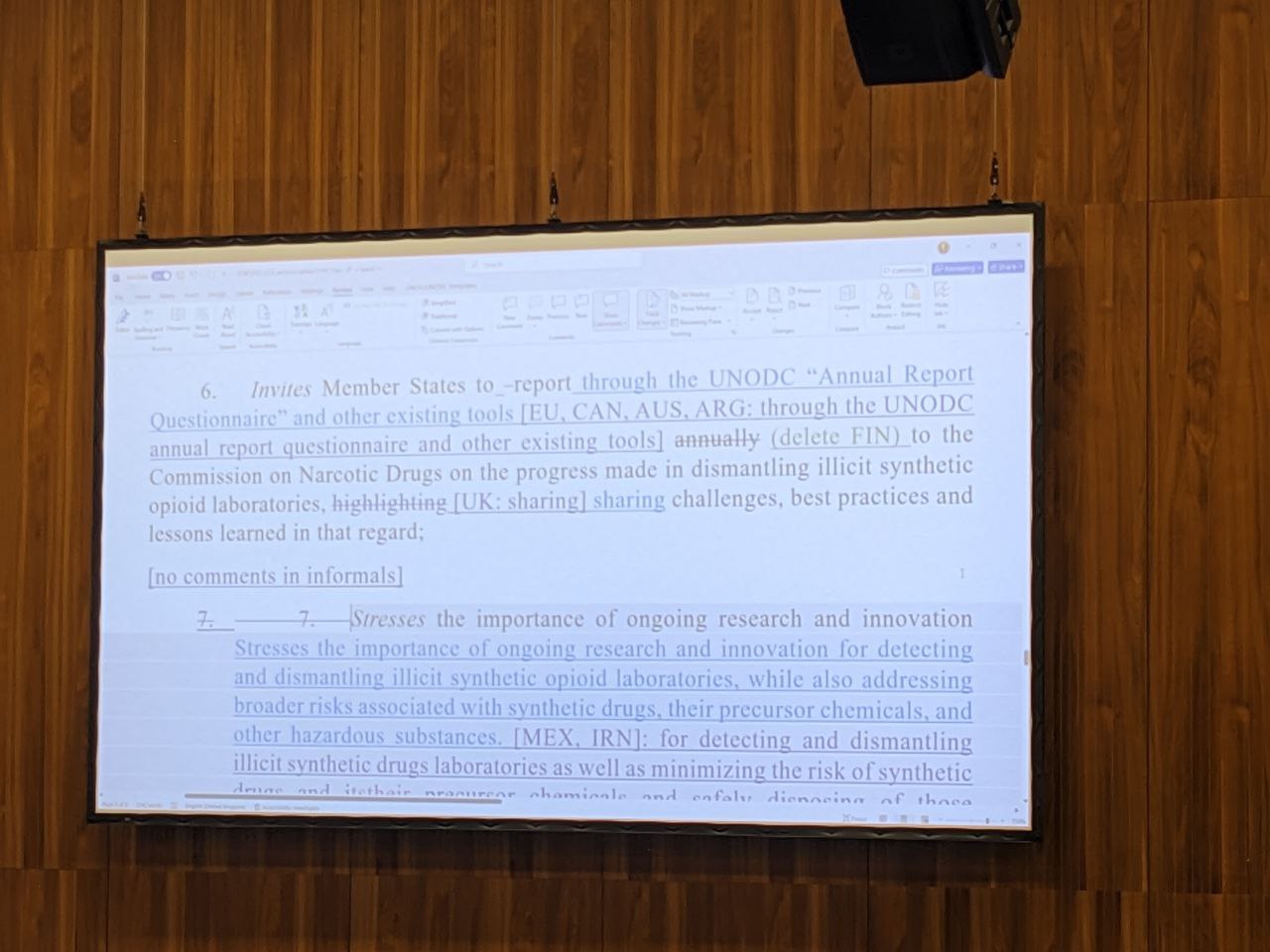
China: we suggest here also having ‘drugs’ instead of ‘opioids’. It should be encouraged to report on all synthetic drug laboratories.
Mexico: That linguistic suggestion would better reflect reality. The root of the annual report suggests a path. We want to change ‘and to share’ instead of ‘sharing’ — one is information via the annual report and it’s another question to do it via this framework.
Chair: Comments?
United States: We would like to have a highlight on synthetic opioid laboratories. ‘Dismantling illicit synthetic drug laboratories, including synthetic opioid laboratories’.
China: I think all of us can understand that we can emphasise synthetic opioids. Here it’s about reporting information about synthetic drug laboratories. We don’t have any synthetic opioid laboratories in china. If we have it like this, we don’t have to report anything then. We want to highlight all synthetic drugs. We don’t need to mention too much something else. Synthetic drugs includes synthetic opioids, amphetamines, methamphetamine, etverything.
United States: The point is quite relevant. That’s why we didn’t propose ‘in particular’ just to ‘include’ synthetic opioid laboratories’ specifically in the data call. Not a greater emphasis than on other synthetic drug laboratories, but just making it explicit.
Chair: Can you live with ‘including’?
China: OK, we have been very flexible.
OP 7
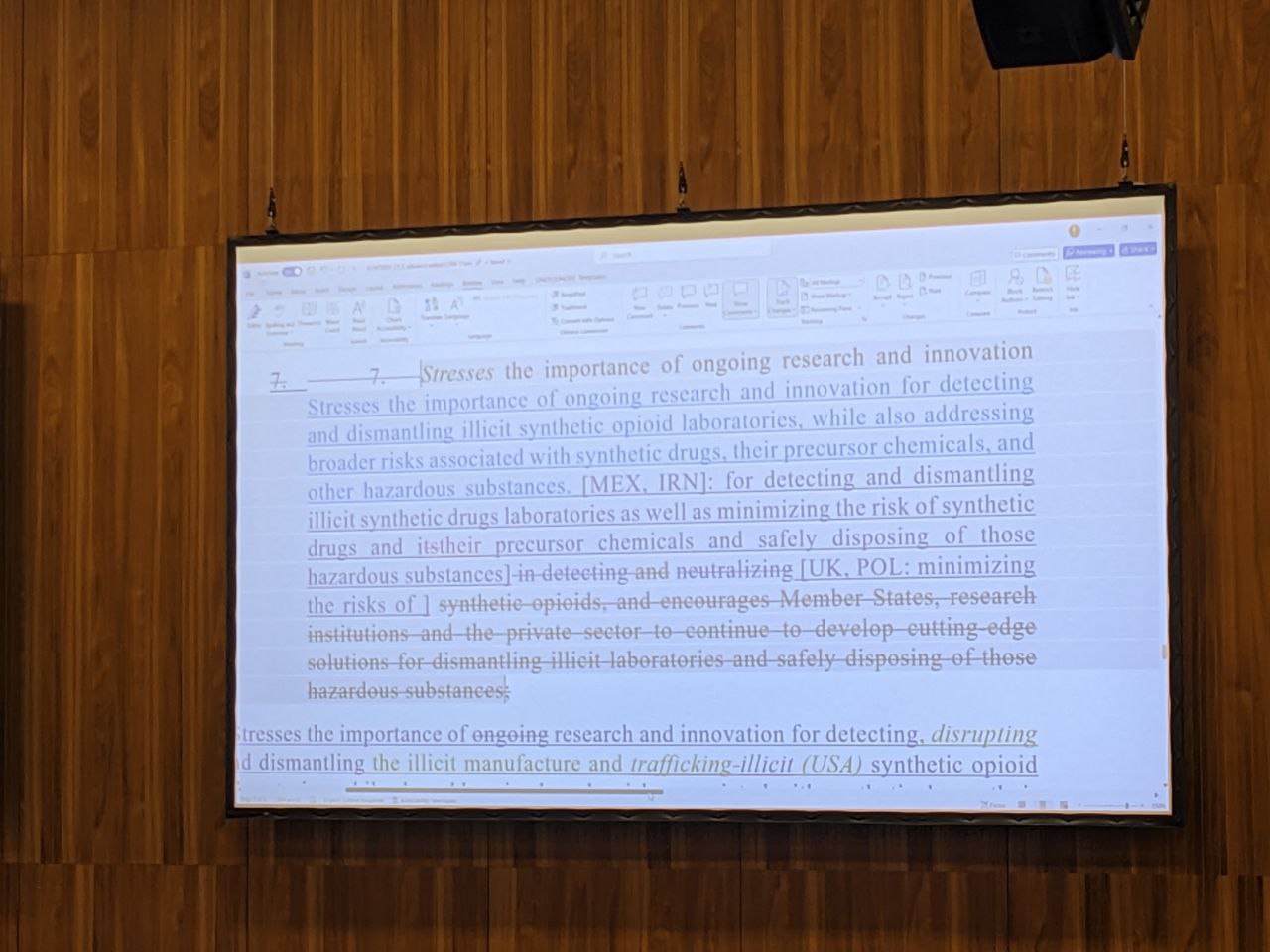
Poland: We want to work on the version below.
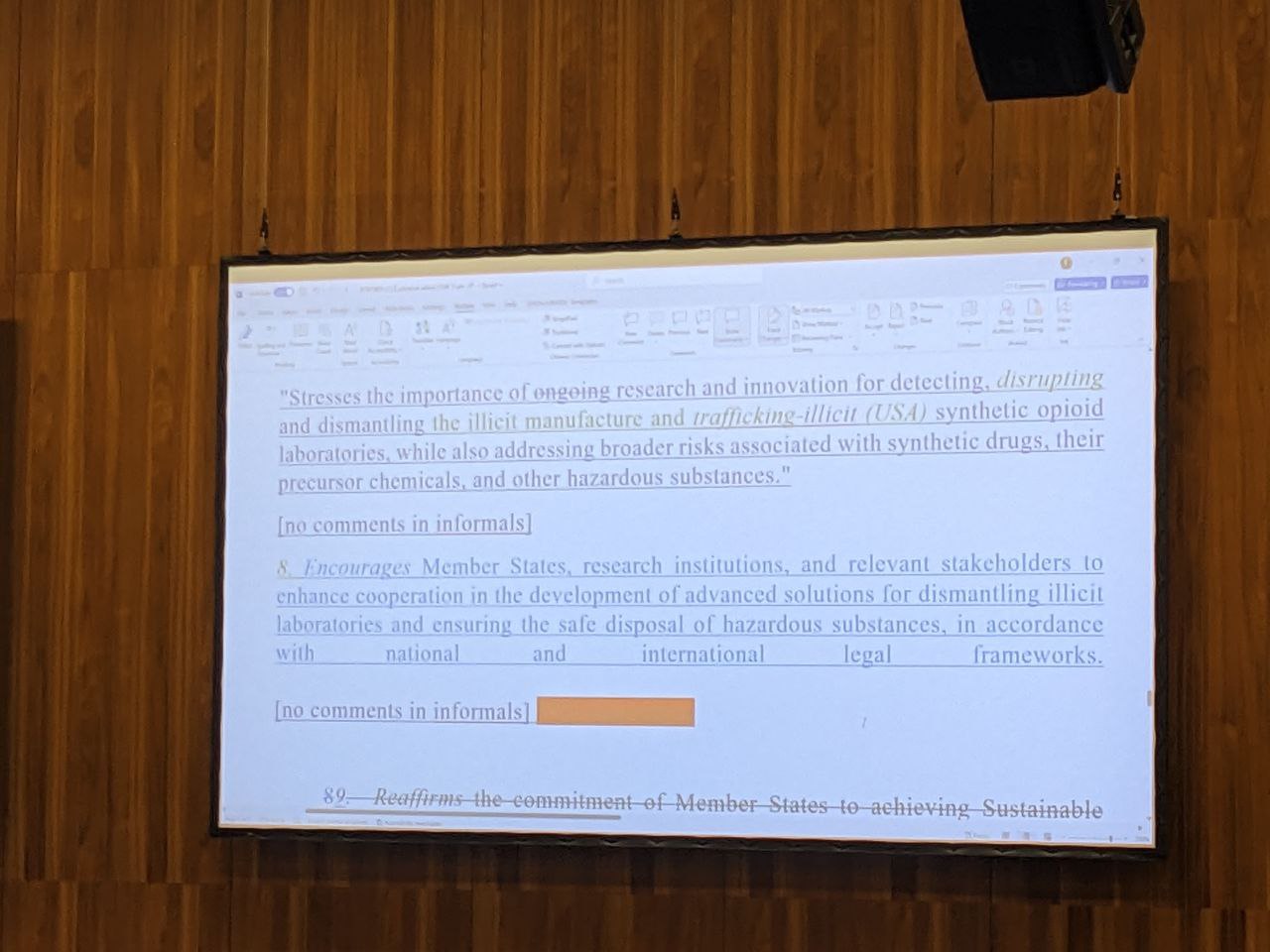
Chair: Comments?
China: I don’t know why there are so many things there. Let’s add ‘illicit synthetic drugs, including synthetic opioid laboratories,..’ and then after ‘associated with’ follow with ‘any other hazardous substances involved’.
United States: We prefer the previous version. This is another case where specificity is warranted. We’re stressing the importance of research and innovation. If we want to make it that broad, then we could stop at ‘innovation’. To drill down the intent of the sponsor, we must focus on stressing innovation on dismantling synthetic opioid laboratories. The larger synthetic drugs piece is captured quite nicely here. So we have a strong preference for the original.
Chair: needs further discussion in informals.
OP8
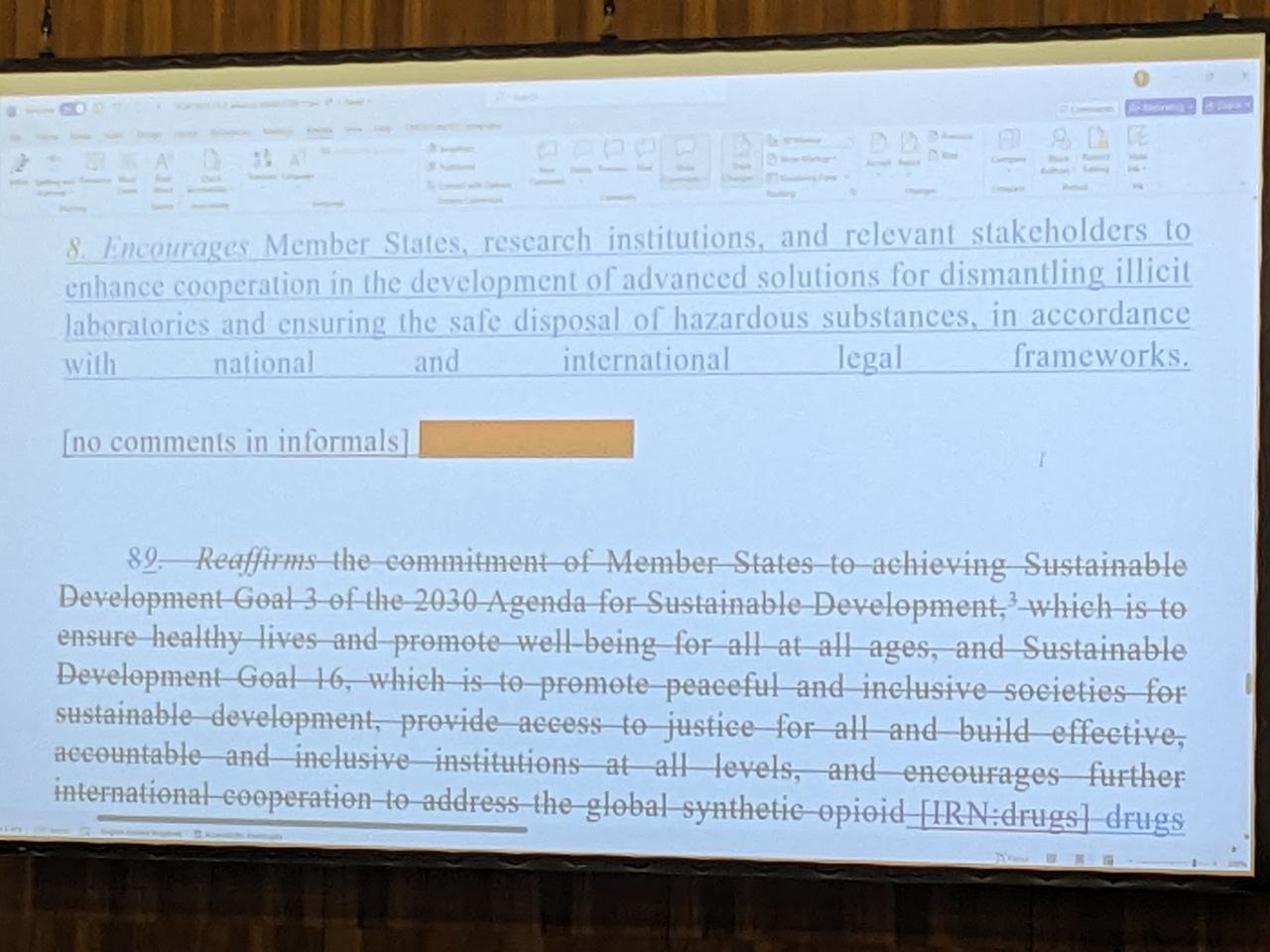
Chair: Comments?
United States: Just a moment. We have issues with the wording. The concept is OK and is a nice follow up paragraph where the paragraph above is specific to synthetic opioids. And this one broadens out the scope and it’s a nice balance. However, ‘in accordance with..’ You cannot be ‘in accordance with an international legal framework’. They can consist of conventions / treaties that a State may not be party to. Small edits to the paragraph: ‘in accordance with domestic law and taking into consideration international legal frameworks’.
China: We’d better have the definition before ‘laboratories’. ‘Illicit laboratories could be anything. We need to focus on ‘synthetic drug laboratories’.
Poland: We agree with Chinese colleagues to include ‘synthetic drug laboratories’ and adding ‘…, in particular synthetic opioids laboratories’.
United States: After some consideration, we’d like to edit our proposal to say ‘in accordance with domestic and international law’. It encompasses any party’s obligations and it’s clearer.
Chair: Comments? Agreed in CoW? It is so decided!
OP9
Chair: Comments?
United States: I wasn’t in previous negotiations so I want to explain our purpose to delete this paragraph. The United sStates is worried about language reaffirming Agenda2030 and SDGs _ it’s a programme of soft global governance contrary to the United States sovereign and we will not reaffirm them as a matter of (inaudible)
Canada: We want to support retaining this paragraph.
Chair: We move on.
OP10
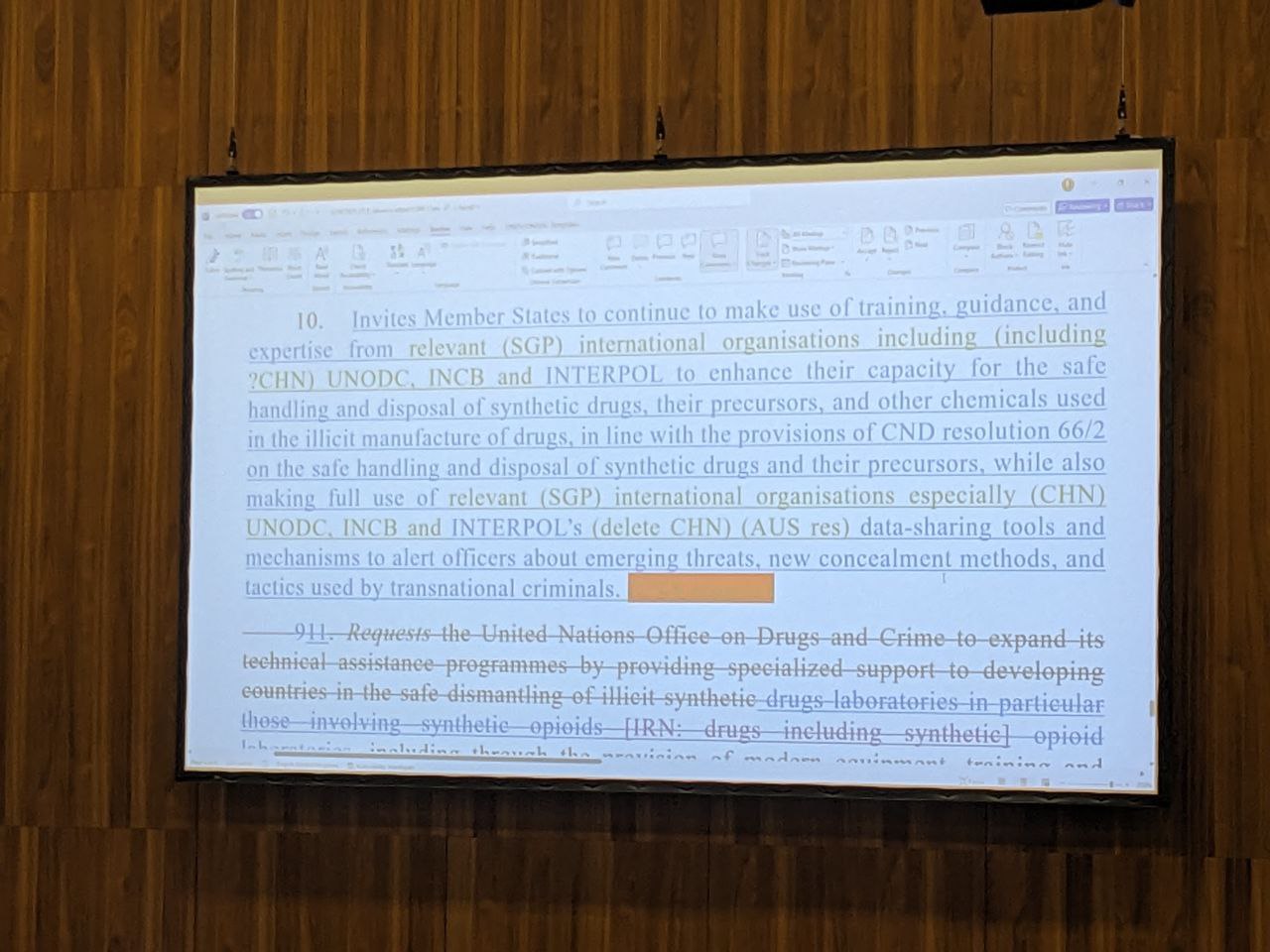
United States: Same as in the previous paragraph. We suggest deleting the list of international organisations in both places.
Canada: it’s important at least once to mention INTERPOL and other colleagues have a similar interest with other organisations. Happy to work with member States to find a consensus outcome. We can discuss it further
Brazil: Add Brazil next to Canada in favour of retaining this language.
Australia: Can you please add us too behind Brazil to retain the list of organisations?
Turkey: We also support this request to retain INTERPOL.
United States: I’m confused about which paragraph we’re working on. The document I have has an OP 10 alt, proposed by the sponsor.
Chair: No, we don’t have that. This looks like it needs to go to informals.
Poland: Can we check 2 or 3 paragraphs that seem to be agreed in informals before we move to other resolutions?
Chair: Which ones?
Poland: OP1, first part.
Chair: Comments?
Poland: Confused as to why the version on the screen doesnt have the alt paragraphs as we discussed. So perhaps we will skip this exercise and wait until we unify this.
Chair: It’s the sponsors uploading this. With their request, we will come back to this with more clarity on the paragraphs remaining. We need a technical break and consider L4.
L.4. Complementing the United Nations Guiding Principles on Alternative Development
L.4. Complementing the United Nations Guiding Principles on Alternative Development
PP3 alt

Chair: Agreed in CoW?
Italy: We agreed in informals this paragraph but we agreed to this paragraph pending deliberations on other paragraphs that we have after this. The original PP3 talked about human rights, governance and other important elements. We’re ready to agree on this formulation without those elements provided those elements are kept elsewhere in the resolution. We’re in your hands.
Chair: Other views? To Italy, as you know, nothing is agreed until everything is agreed. We can say ‘Agreed in CoW’ and can later come back to it depending on other aspects of the resolution.
Italy: Agreed.
Chair: Let’s write it as such.
PP6

Chair: Can we say it’s agreed in CoW? No objections so we can write it.
PP10
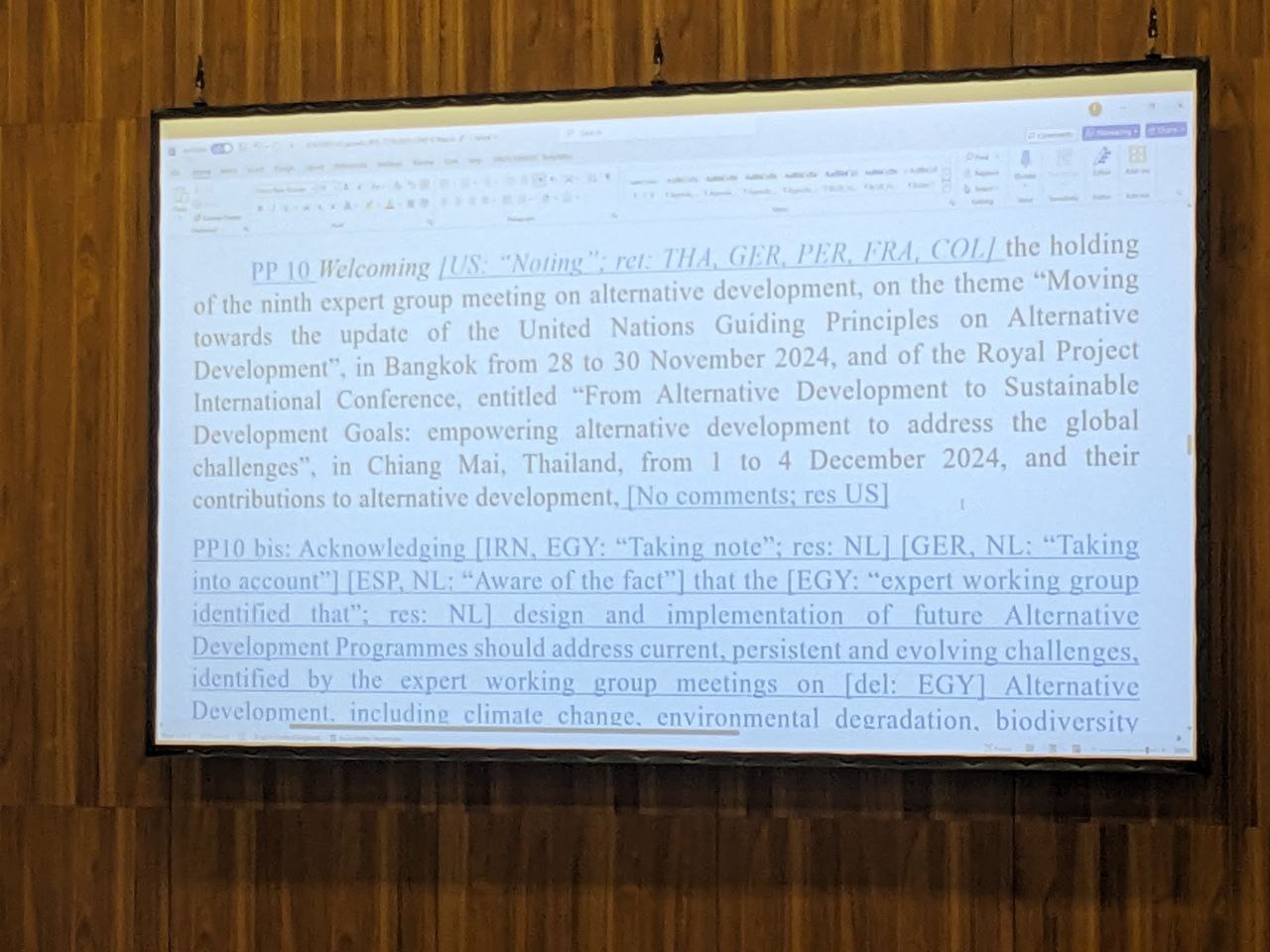
Chair: From what we can see, it’s just about changing ‘welcoming’ to ‘noting’ — is this still valid re: noting? Agreed by all delegations?
Germany: We would like to ask for the retention of ‘Welcoming’.
United States: We have a reservation on this paragraph that we can lift if ‘welcoming’ can be replaced with ‘noting’.
Peru: In the meantime, my delegation would like to keep ‘Welcoming’ too.
Netherlands: In principle we would like ‘Welcoming’. We realise US’ reservation and suggest ‘Noting with appreciation’.
Peru: Thanks for that suggestion. ‘Noting’ is not enough for the sponsors but giving it a warm appreciation could help us breach the differences we have in this moment and we can go with ‘noting with appreciation’.
Denmark: We support ‘Welcoming’ — it’s the appropriate term. If the sponsors are happy with ‘Noting with appreciation’, we’d go with it.
Chair: Agree, US?
United States: We cannot accept anything except ‘Noting’.
Chair: This should go to consultations in informals.
OP1
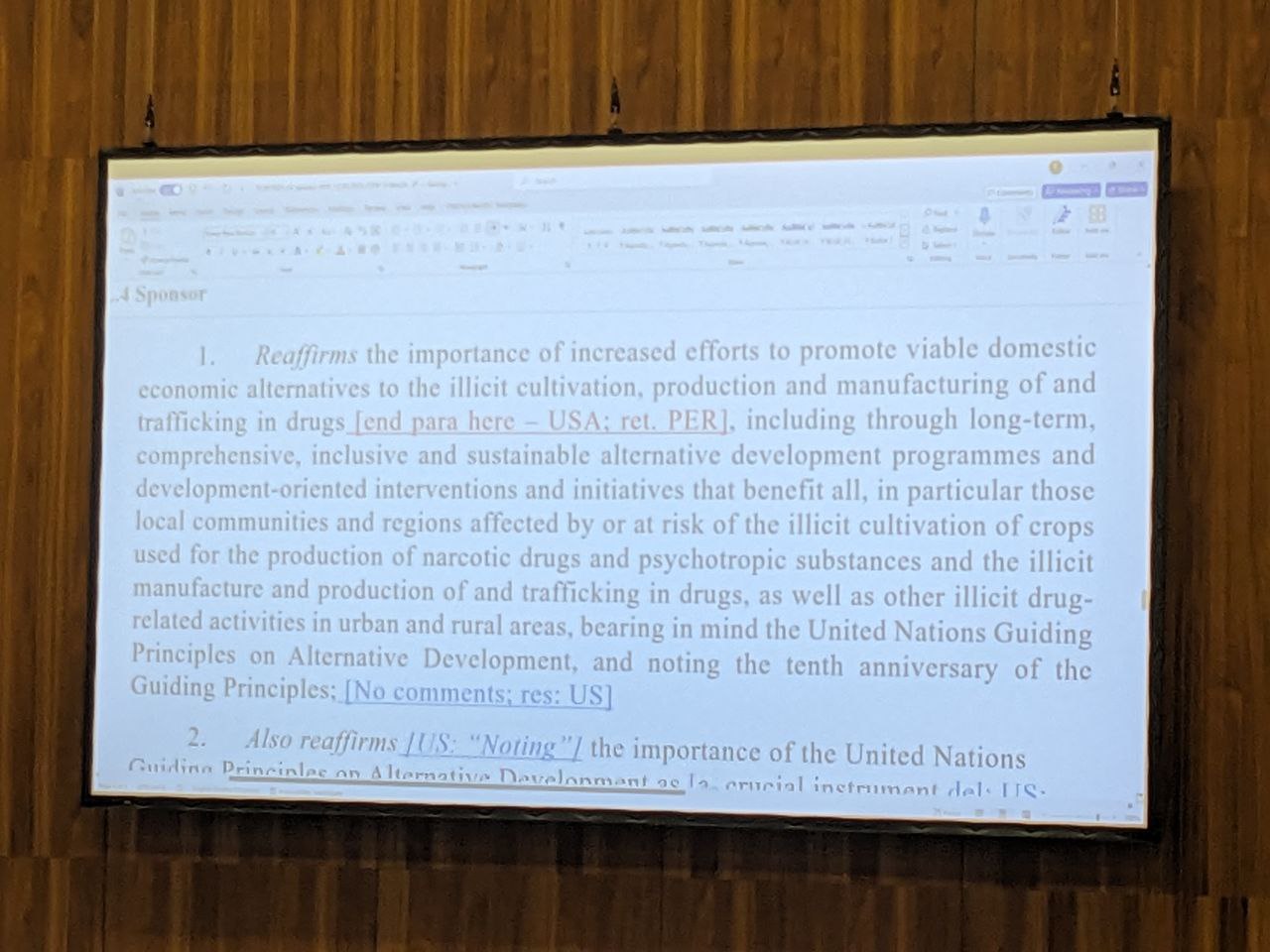
United States: We could lift our reservation provided the Member States agree with our amendment.
Netherlands: The suggestions after ‘including’ add crucial content to this paragraph.
Germany: This is verbatim from the Ministerial Declaration so we would like to retain it as a whole.
Thailand: We would also like to retain the pragraph.
OP2

(…): We have to go through this paragraph elsewhere.
OP3
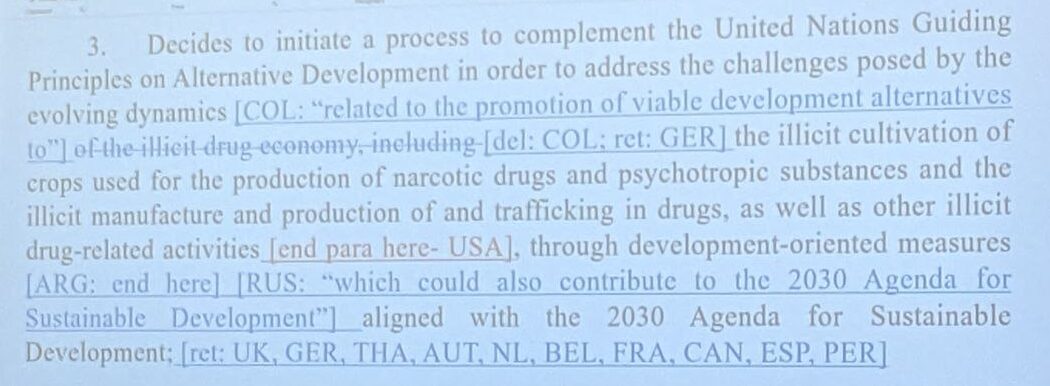
Peru: I would like to take advantage of the moment – we had a fruitful exchange yesterday re the proposal made by Colombia. The reasons were explained extensive. We prefer to use this as a border concept rather than a promotion of viable alternatives. Colombia requested more time to reflect on this and after discussions with capital, maybe they have further things to share:
Colombia: we are in the position to retain the text proposed by sponsors.
Chair: I see there is a request by the USA on the screen to end the sentence after “drug related activities”. Do we sustain this;
United States: We sustain this suggestion.
Chair: So do other delegations agree?
Venezuela: We request in the 4th line, we request to put this in brackets “illicit drug economy” – a reservation from Venezuela.
Peru: I would kindly ask for further comment from Venezuela about their reservation. It is a common term we use at CND,
Venezuela: We will come back later after consultations with our capital.
Chair: So do I take it that this reservation is not acceptable to the sponsors?
Peru: Yes we prefer he retention of “illicit drug economy”
OP4 alt
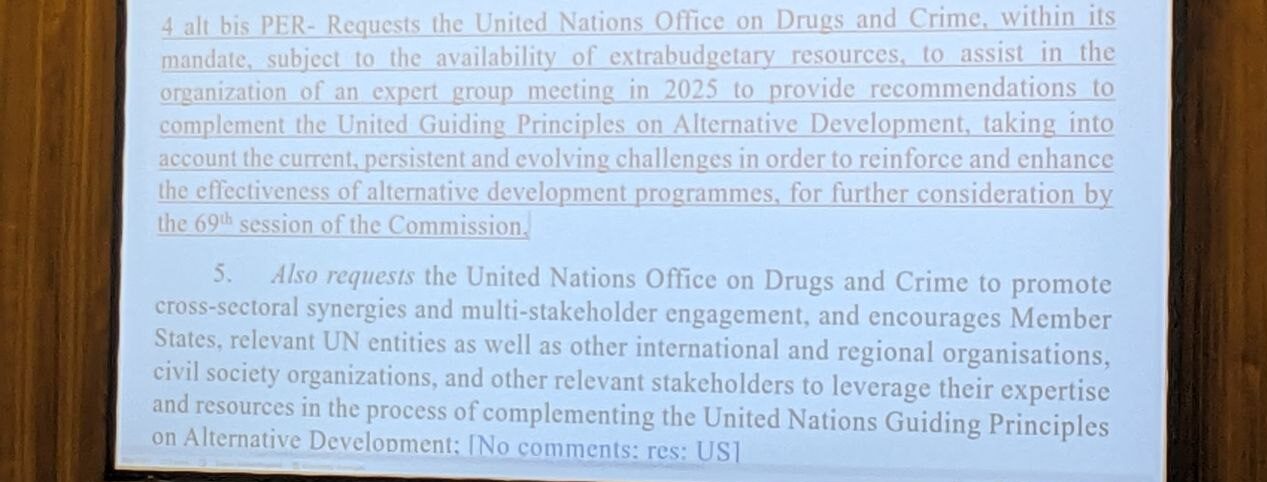
Chair: We have some proposals here, what is your preference addressing them, dear sponsor?
OP4 alt bis
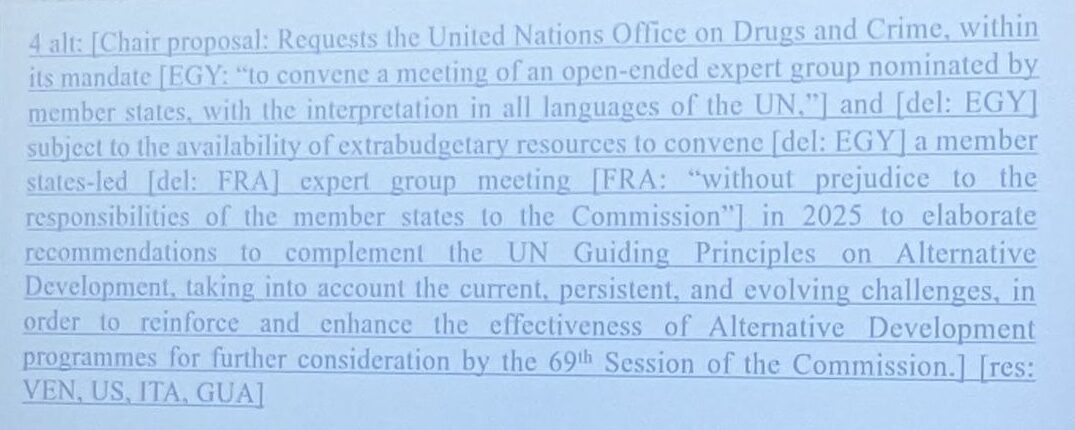
Peru: alt bis “UNODC within its mandate, subject to the availability of extrabudgetary resources, to assist in the organization of an expert group meeting in 2025 to provide recommendations to complement the Guiding Principles on Alternative Development, taking into account the current persistent and evolving challenges in order to enforce and enhance the effectiveness of AD programmes for further consideration by the 69th session of the Commission.” We are convinced the best way to move forward is with an open and inclusive expert group meeting. We are not looking for an intergovernmental meeting. We selected this format because it has proven to be efficient and is known and is an inclusive and transparent way of working. The aim of this has to be on MS sharing experiences and participating countries but we cannot go along with the open ended intergovernmental meeting because of the implied cost as we are facing a liquidity crisis. So this is not a closed group, we are ready to welcome others, but we are not int he position to pay all countries that would like to participate – we are sorry about this, but this is the reality of our times.
France: We are happy to support this.
Colombia: The new proposal has an interesting (…)
Belgium: Thank you for explaining the technical and financial background.
Egypt: It was either during previous COW meetings or informal, our colleague had told us he will provide us with the language pertaining to the formation of the group – I am seeking clarification to the source of this language and as to why we are preparing guidelines.
Spain: We support this paragraph but there seems to be a word missing “united NATIONS guide principles”
Italy: Support.
United Kingdom: Support.
Netherlands: Support.
Venezuela: This is the first time we see this wording and didn’t have time in the informals to consider this so we would like to include our reservation.
Thailand: Support.
Chair: So we have a few requests for more time and clarifications. We move on.
OP5

Chair: Comments?
United States: We do have edits to OP5 — we would start the paragraph with ‘Encourages’, so, delete from ‘also request’ to ‘and’ in the second line. We’d also strike ‘UN’ and delete from ‘as well as’ to ‘relevant stakeholders’. After ‘in the process of’ we’d say ‘developing recommendations to complement…the United Nations…’. So it would look like: Encourages Member States relevant entities in the public and private sector to leverage expertise and resources in the process of developing recommendations to complement the Guiding Principles with the support of UNODC.
Chair: Is the suggestion accurately reflected on the screen?
[INSERT PARAGRAPH PHOTO]
United States: Yes.
Chair: Comments?
Netherlands: We thank the US efforts to find a way out but you see there’s multiple parts in this paragraph. It does multiple things. Engage in cross-sectoral synergies with relevant UN stakeholders on the ground involved in the functioning of AD. And encourage member states to work together with all relevant stakeholders and entities. Now it’s much less than this original cross-sectoral synergy. On that basis, we need to place a reservation on these changes for the time being.
Peru: We would like to promote the cross sectoral synergies and the cooperation of UN entities on this matter. Recently we had a MoU between UNODC and UNIDO to streamline their capabilities to enhance AD efforts. It would be good to do something similar with FAO, the atomic agency, etc. That’s the purpose of this paragraph and why we’d like to retain the original language.
Germany: In line with previous statements (…) we had sensitive discussions about many topics so we think it is very relevant to engage with UN agencies and other stakeholders – I would also make a point about including civilly society, we believe we should involve affected communities in these decisions to it is aligned with what is happening in realm life.
Canada: Echo Germany`s comment about civil society contributions and insist on retaining this.
OP6
Chair: Do we accept this with the word deletion? I am seeing several delegations asking to retain and also to remove. Any objection to keeping the words “with interest”
Venezuela: We keep our suggestion to delete this wording.
Chair: I also see the suggestions to move this to OP3 or 4.
Netherlands: In the spirit of compromise, we suggest keeping this as an operational paragraph. This is important to the basis of this resolution, but let’s just take note of this conference room paper, and we can then delete “with interest”.
Peru: I thank the Netherlands for this suggestion, my delegation is also flexible about moving the para between OPs but my preference is to keep it as an OP and not a PP.
Germany: In the spirit of compromise, we can also go along with this.
Chair: Okay, so do we remove “with interest” and keep this as an operational paragraph?
Venezuela: As we have said before, we consider this not an operational para, it is just taking note… we consider that this should be a PP.
Peru: I would like to try to make it more operational: “takes into account the conference room paper”
Germany: i wound like to point out htat we review the editing guidelines, as was a common suggestion. Takes note is not a common operative word, but it is actually mentioned as a possibility and has been used in the past, in about 5 AD resolutions.
Mexico: We understand it is not a matter of preference, but this will be sent through the World, so the qualitative difference of PP vs OP is central to the work.
Egypt: Being consistent with previous interventions, we highly appreciate the work of Peru and Germany. The outcome document in this regard is well noted and the working group or expert group or the intergovernmental group will consider this as one of themain documents to work on. We have no doubt about that. We have up in the PPs, we were supposed to welcome the work of the holding of the meeting, in other PPs, we have taken note of the findings and the challenges identified. I think this is logic. Not all MS have participated, so it is more logical to have this in the PPs and so we propose to move it to PP10. We don’t oppose to “taking note with interest” but in a PP.
Venezuela: We are not in favor of this practice, taking note of CRPs. Confirming and reaffirming the document that we are taking note of, does not reflect the views of all participants. The content of the document will be taken and cherry-picked – this is our fear. It worries us that this is supposed to be a basis of any discussion where it does not reflect the stance of everybody. This paragraph belongs to PPs, this is a fact, it is a legal practice in this body. I am willing to show flexibility, but it doesn’t belong in an OP.
Saudi Arabia: I speak along the line with Egypt and Venezuela – we haven’t seen this document until the beginning of negotiations, so we need more time to consider it. We agree it should be moved to PP.
Chair: So it seems there is no disagreement on the para, but the placement. Can we agree on the paragraph pending placement?
Netherlands: We agree, but then we don’t agree with the deletion of “with interest”.
USA: Can you clarify what we are agreeing on now? Does that include “with interest”?
Chair: Yes.
Spain: The correct placement for this text is in the operative part and that was clarified by Secretariat yesterday that is absolutely fine to be placed there. So I just want to make a point, but we agree with Chair’s suggestion.
Germany: We would like a new formulation. We are flexible on the placement.
Chair: So are we in agreement?
Netherlands: Only if it’s in the operational part can we agree to the text.
Chair: Okay that means we don’t have an agreement. Meeting adjourned until 3pm.